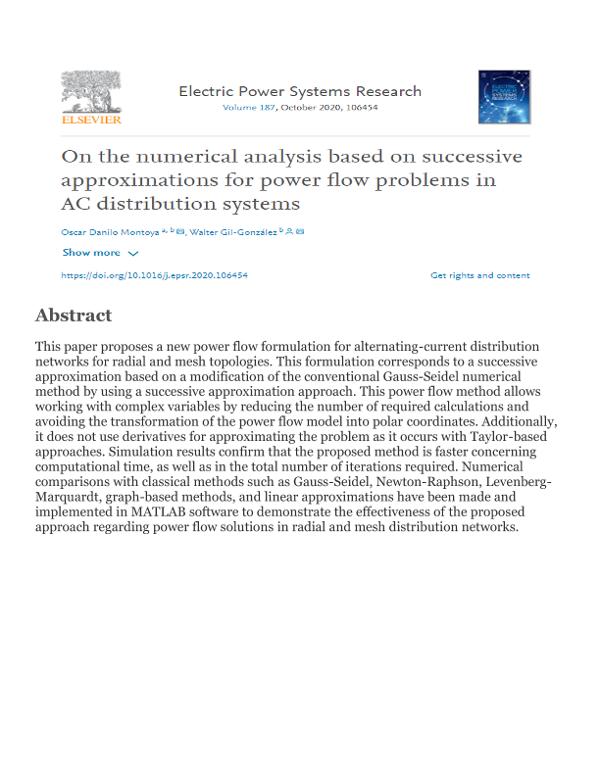Mostrar el registro sencillo del ítem
On the numerical analysis based on successive approximations for power flow problems in AC distribution systems
| dc.contributor.author | Montoya, Oscar Danilo | |
| dc.contributor.author | Gil-González, Walter | |
| dc.date.accessioned | 2020-10-30T15:59:04Z | |
| dc.date.available | 2020-10-30T15:59:04Z | |
| dc.date.issued | 2020-10 | |
| dc.date.submitted | 2020-10-29 | |
| dc.identifier.citation | Montoya, O. and Gil-González, W., 2020. On the numerical analysis based on successive approximations for power flow problems in AC distribution systems. Electric Power Systems Research, 187, p.106454. | spa |
| dc.identifier.issn | 0378-7796 | |
| dc.identifier.uri | https://hdl.handle.net/20.500.12585/9512 | |
| dc.description.abstract | This paper proposes a new power flow formulation for alternating-current distribution networks for radial and mesh topologies. This formulation corresponds to a successive approximation based on a modification of the conventional Gauss-Seidel numerical method by using a successive approximation approach. This power flow method allows working with complex variables by reducing the number of required calculations and avoiding the transformation of the power flow model into polar coordinates. Additionally, it does not use derivatives for approximating the problem as it occurs with Taylor-based approaches. Simulation results confirm that the proposed method is faster concerning computational time, as well as in the total number of iterations required. Numerical comparisons with classical methods such as Gauss-Seidel, Newton-Raphson, Levenberg-Marquardt, graph-based methods, and linear approximations have been made and implemented in MATLAB software to demonstrate the effectiveness of the proposed approach regarding power flow solutions in radial and mesh distribution networks. | spa |
| dc.description.tableofcontents | 1. Introduction 2. Power flow formulation 3. Convergence analysis 4. Test systems and comparison methods 5. Numerical results 6. Conclusions and future works CRediT authorship contribution statement Declaration of Competing Interest References | spa |
| dc.format.mimetype | application/pdf | spa |
| dc.language.iso | eng | spa |
| dc.source | Electric Power Systems Research; Vol. 187 (2020) | spa |
| dc.title | On the numerical analysis based on successive approximations for power flow problems in AC distribution systems | spa |
| datacite.rights | http://purl.org/coar/access_right/c_14cb | spa |
| oaire.version | http://purl.org/coar/version/c_970fb48d4fbd8a85 | spa |
| dc.identifier.url | https://www.sciencedirect.com/science/article/abs/pii/S0378779620302583 | |
| dc.type.driver | info:eu-repo/semantics/article | spa |
| dc.type.hasversion | info:eu-repo/semantics/publishedVersion | spa |
| dc.identifier.doi | 10.1016/j.epsr.2020.106454 | |
| dc.subject.keywords | Alternative-current | spa |
| dc.subject.keywords | Distribution networks | spa |
| dc.subject.keywords | Numerical methods | spa |
| dc.subject.keywords | Power flow formulation | spa |
| dc.subject.keywords | Laurent’s series | spa |
| dc.rights.accessrights | info:eu-repo/semantics/closedAccess | spa |
| dc.identifier.instname | Universidad Tecnológica de Bolívar | spa |
| dc.identifier.reponame | Repositorio Universidad Tecnológica de Bolívar | spa |
| dc.publisher.place | Cartagena de Indias | spa |
| dc.type.spa | Artículo | spa |
| dc.audience | Investigadores | spa |
| oaire.resourcetype | http://purl.org/coar/resource_type/c_2df8fbb1 | spa |
Ficheros en el ítem
Este ítem aparece en la(s) siguiente(s) colección(ones)
-
Productos de investigación [1378]
Universidad Tecnológica de Bolívar - 2017 Institución de Educación Superior sujeta a inspección y vigilancia por el Ministerio de Educación Nacional. Resolución No 961 del 26 de octubre de 1970 a través de la cual la Gobernación de Bolívar otorga la Personería Jurídica a la Universidad Tecnológica de Bolívar.












